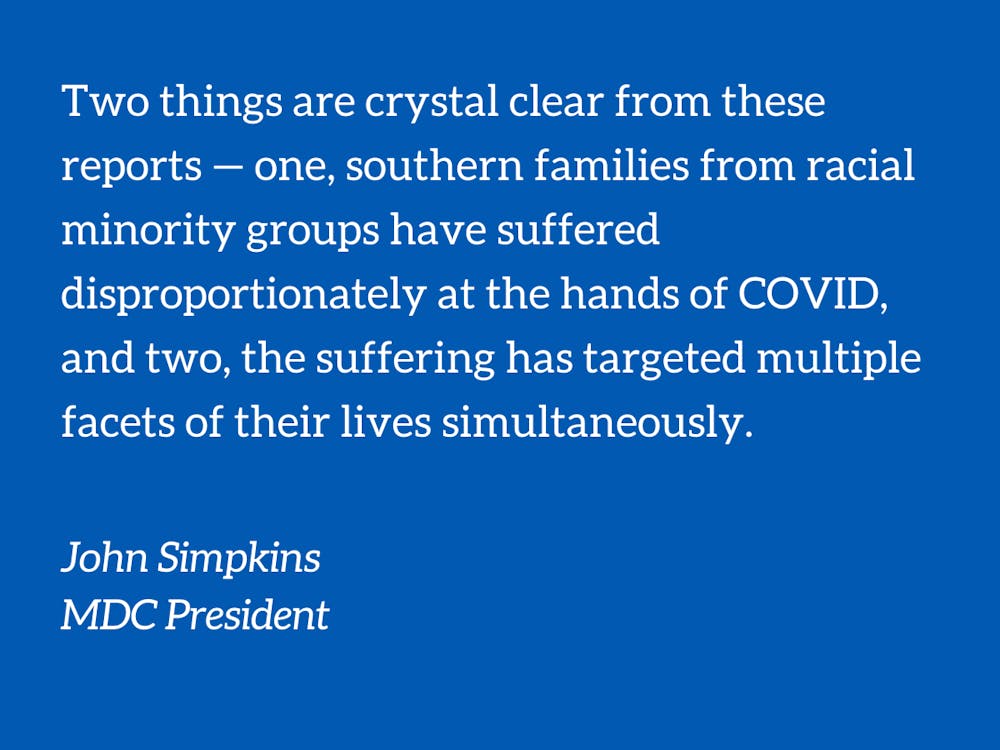Editor’s note: John Simpkins is the president of the MDC organization, whose work is mentioned towards the end of this article.
The COVID-19 pandemic has been the toughest financial, economic, and public health crisis in recent times. By fall of 2020, the United States had become the global epicenter of the coronavirus pandemic, leading the world in both number of cases and deaths. As of December 2021, about 20 million households in the States were running food shortages thanks to inefficiently managed lockdowns and a prevailing scarcity of food, medicine, and social support.
In a lot of ways, the South has borne the brunt of this deadly disease more terribly than the rest of the country. Thomas LaVeist, dean of public health and tropical medicine at Tulane University, called it “a perfect storm of characteristics” combining rising poverty, chronic illnesses, and systemic racial inequity into an inevitable rampage.
Among the social institutions most affected in the ensuing chaos is the Southern family. Cornered by economic, educational, and sociocultural deprivation, families in the South have paid a steep price for both the disease and the measures taken to address it.
COVID-19 and the Southern family: A story of mounting hardships
The financial well-being of Southern families was the first to take a hit following the initial lockdown, raising unemployment rates and crashing state economies as families increasingly dug into their savings.
The practices of social distancing, necessary as they were, directly clashed with the prevailing culture of the South, throwing family members into a state of discomfort and alienation. Take the Maryland realtor describing the real-estate industry as the ‘handshaking crowd’, or the Louisiana governor, John Bel Edwards deeming the social distancing protocols as ‘completely opposite to what we’re used to here.’
Southern hospitality, entailing frequent physical contact and a general attitude of politeness and care, had to be artificially broken down in favor of social isolation. This not only took a major toll on the mental health of Southern residents but also caused rising tensions and conflicts within low-to-middle income Southern families, particularly endangering the well-being of children.
The disproportionate impact on marginalized families in the South
Furthermore, deeper intersectional research has consistently shown that a nexus of intergenerational poverty, greater prevalence of underlying health conditions, and more difficult access to healthcare has had more pronounced consequences for the racial and ethnic minority groups among Southern families.
As far back as April 2020, Louisiana recorded 755 deaths, the largest of any state in the country—70% of which were African American people. The death toll wasn’t proportional to the population, since African American people only accounted for 32% of the state’s population. Elsewhere, a county-level ecological study found adequate evidence that socio-spatial and economic polarization exacerbated the COVID-19 disease burden in Georgia.
Education and food troubles have also made matters worse, with children from several Southern counties struggling without the proactive support of schools.
For instance, before the virus, two-thirds of children from Southern families sourced a good part of their daily nutrition from meals offered at schools and child care facilities. Post-lockdown, many either relied on fleets of volunteer buses or faced the possibility of starvation.
Two things are crystal clear from these reports — one, southern families from racial minority groups have suffered disproportionately at the hands of COVID, and two, the suffering has targeted multiple facets of their lives simultaneously.
Building back up: reformative measures for Southern families
Addressing the virus’ disproportionate damage to Black families in the South needs focused structural interventions. The three major pillars of suffering — medical, economic, and educational — each need their own set of targeted measures to level the exacerbated damage done by the pandemic.
Take education as an example. “The toxic inequities in education experienced by black communities have been exacerbated by the COVID-19 pandemic,” states the front page of “Black America and COVID-19”, a research guide curated by Harvard. To offset this exacerbation, we need initiatives that specifically target children’s education at the foundational stages of their growth.
One such initiative is “Great Expectations”, launched by the Kate B. Reynolds Charitable Trust with MDC as its activating agency. Great Expectations is an early childhood initiative that works to ensure that children in Forsyth County, North Carolina enter kindergarten ready to learn and leave set for success in school and in life.
Over in North Carolina, the Oak Foundation, in partnership with MDC, is building a learning and action network to study intersectional equity. Established in 1983, Oak has 11 programmes including through which they have made more than 5,000 grants to organizations globally. Their six main programmes target environment, preventing sexual abuse of children, housing and homelessness, international human rights, issues affecting women and learning differences. The learning and action network, called "Learning for Equity: A Network for Solutions," or LENS-NC, aims to incorporate disability rights into reformative measures, reducing race and income disparities in educational outcomes among students with learning differences.
It is only by replicating such concerted initiatives in the financial and medical sectors that Southern states can address the disparate impact of COVID-19 on black families and create environments where marginalized communities can access equal opportunities and experience an equitable quality of life.
John Simpkins is a constitutional law scholar and former Obama Administration counsel who has played a leadership role in advancing an equity agenda for women and people of color in the South. Prior to becoming president for MDC, John was the Vice President of Aspen Global Leadership Network at the Aspen Institute.
Get The Chronicle straight to your inbox
Signup for our weekly newsletter. Cancel at any time.

